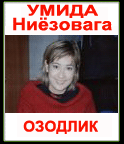By Bruce Pannier
 |
| Umida Niyazova and her son (file photo) |
| (Courtesy Photo) |
Niyazova appeared briefly in a Tashkent courtroom today before the trial was adjourned to another date. The 32-year-old freelance journalist could face many years in jail based on the list of charges.
"They do not show us anything; no one tells us anything. The last time anyone saw her was two months ago, when her sister-in-law saw her," Niyazova's mother says.
In And Out Of The Courtroom
Some relatives and representatives of rights groups were allowed in the courtroom. But Niyazova's aunt, who identified herself as Shafoat, was outside throughout this morning's proceedings.
"A lot of people were there outside the court building before 11 o'clock [when the trial was scheduled to start]," Shafoat said. "At 11:30, a lawyer came out and said the court had adjourned because they couldn't read all the tomes. Then they took Umida back. They arrived at 10:30, and they left at 11:30 in an armored vehicle. You couldn't see into it."
Niyazova was first detained at the Tashkent airport in December. She was returning from a trip to Kyrgyzstan where she interviewed witnesses to violence in the eastern Uzbek city of Andijon in May 2005. She was released, but her computer and passport were confiscated.
Uzbek authorities hinted, and later officially charged, that Niyazova possessed anticonstitutional or banned religious material. It is a charge she dismissed in comments to RFE/RL's Kyrgyz Service at the time.
"For me, these accusations of anticonstitutional activities are absolutely slanderous," Niyazova said. "To say they found anticonstitutional material on my person is absurd, and I've said this before."
Questionable Legal Advice
Fearing for her safety after her detention in December, Niyazova fled to Kyrgyzstan and sought asylum through the office of the United Nations. Niyazova's lawyer at that time, Abror Yusupov, reportedly advised her to return to Uzbekistan, saying Uzbek authorities found no anticonstitutional material on her computer.
Niyazova was detained as soon as she crossed into Uzbekistan in late January, and was taken first to Andijon and then to Tashkent. She has been in custody ever since.
Prosecutors portray Niyazova as a criminal trying to undermine the government. But rights groups and others are championing her cause and calling on Uzbek authorities to release the single mother of a 2-year-old son.
Andrea Berg, head of the Tashkent office of Human Rights Watch (HRW), notes that Niyazova also did some work for HRW, which Uzbek authorities have threatened with expulsion over criticism of official activities.
"While she was working as an independent rights activist and independent journalist, she worked at the same time as a translator at the office of Human Rights Watch in Tashkent," Berg said.
Refugees from Andijon streaming into Kyrgyzstan in June 2005 (TASS)Meanwhile, for those closest to Niyazova -- like her mother, Sojida -- information about her health and the case against her has been difficult to obtain.
"They do not show us anything; no one tells us anything. The last time anyone saw her was two months ago, when her sister-in-law saw her," Niyazova's mother says. "I do not know what her condition is, because no one has seen her. Her 2-year-old son is living with me."
International Attention
Niyazova's case has received considerable attention outside Uzbekistan. A number of rights organizations have called for Niyazova's release -- including HRW, Amnesty International, Reporters Without Borders, the Committee to Protect Journalists, Freedom House, and the International Women's Media Foundation.
The European Union and the Organization for Security and Cooperation in Europe (OSCE) have raised the issue of Niyazova's case from their respective headquarters and during officials' recent visits to Uzbekistan.
Brussels, in particular, could apply pressure in light of EU sanctions against Tashkent over violence in Andijon, in eastern Uzbekistan. The Uzbek government has stepped up its dialogue with Brussels in recent months in an effort to get some or all of those EU sanctions lifted. The EU is due to review sanctions against Uzbekistan in May.
HRW released a statement today urging the EU to link closer engagement with Central Asian countries to genuine progress in improving human rights.
Today's tightly controlled court appearance will do little to dispel the worst fears of Umida Niyazova or her defenders as this trial continues.
The heavy security inside and around the court building also served as a strong reminder of the Uzbek government's severe approach to its perceived critics.
(RFE/RL's Uzbek Service contributed to this report.)



No comments:
Post a Comment